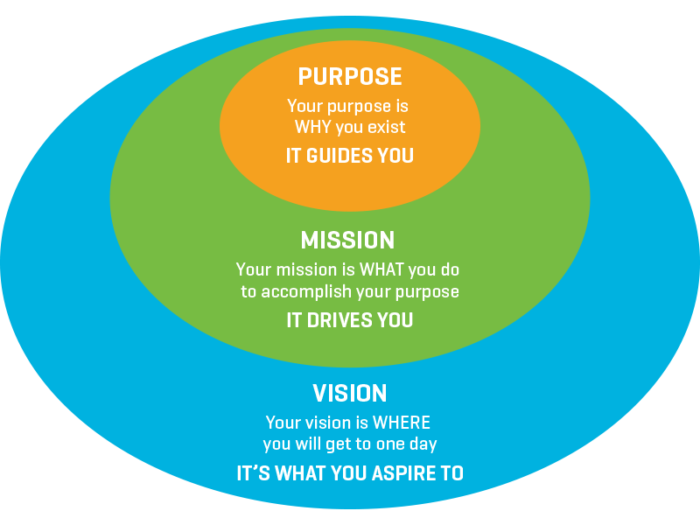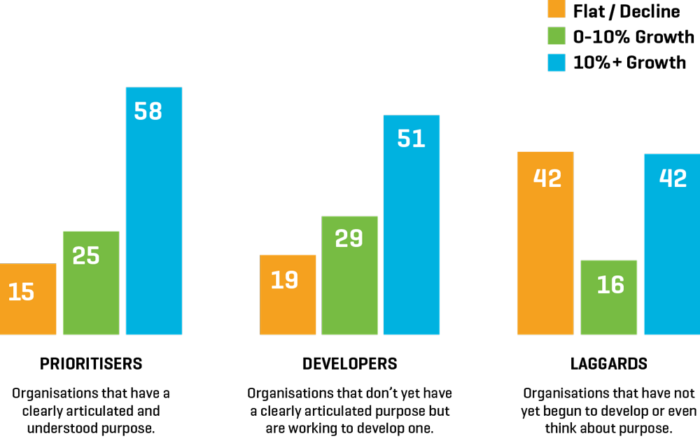Connecting People to Purpose (Part 1)
Purpose has become one of the latest buzz-phrases in business. It’s been the subject of books, speeches and blogs, and on the agenda at high-profile events like the World Economic Forum.
Purpose is acknowledged as a differentiator for business success, and an enabler of change and engagement. But how do you connect your employees to your organisational purpose, and does doing so really make a difference?
Why you exist
Let’s start with what we mean by purpose. The dictionary defines it as ‘the reason for which something exists or is done, made, used, etc.’, or ‘an intended or desired result; end; aim; goal’. Consulting firm EY defines it as ‘an aspirational reason for being that is grounded in humanity and which inspires a call to action’[1].
Purpose in an organisational context is the ‘why’ of your organisation: your reason for being. It’s what gets people up in the morning, and makes them come back the next day.
In this sense, there is a clear difference between your purpose, mission and vision:

Always important, increasingly relevant
Having a clear purpose with a social benefit has helped businesses succeed over the past 200 years. Just look at organisations like Co-op, Sainsbury’s or Unilever as examples of organisations that balanced commercial focus with a focus on social and employee welfare from as early as 1840.
Being purpose-driven clearly isn’t something new. But it is increasingly important. We live in a changing world where previously unimaginable events are happening, against a backdrop of political and economic uncertainty, divided nations, conflict and terrorism, a climate emergency, extreme weather events, and ever-advancing technological developments… the list goes on.
The impacts of our volatile and uncertain world on how organisations connect with customers, stakeholders and employees are significant and continue to change.
Set against this backdrop, achieving long-term success is increasingly challenging. It’s no wonder that leaders of organisations are thinking differently and seeking answers for how they can survive and thrive.
A generational divide?
Millennials – the generation born between the early ‘80s and late ‘90s – also have a significant influence on this shift and how the world is changing.
Today millennials form around half of the global workforce. They are an increasingly powerful voice and influence for employers to take note of. Putting aside myths and misconceptions, the truth is that millennials do have a different attitude and approach to work than older generations, and there are some key themes that employers should bear in mind.
Millennials are more purpose driven and want to know their contribution has meaning and impact in the world. 92% of millennials believe that the success of a business should be measured by more than just its profits [2]; 60% of millennials say a sense of purpose is part of the reason they chose to work for their current employer [3]; and more than half of millennials are even willing to take a 15% pay cut to work for a company that matches their ideals [4].
Clearly these are broad themes, however they represent enough of a trend to influence how organisations behave and think about recruiting and retaining talent.
The positive impact of purpose
So far, so what? Is it simply a ‘truism’ that a clear sense of meaning and purpose will appeal to consumers and employees; providing certainty, confidence, simplicity; getting cut through; and ultimately giving businesses a focus and momentum to succeed in challenging and changing times?
There is some pretty compelling evidence to support this in terms of impact on customers, business performance (shareholders), and employees.
For customers, purpose can be a brand differentiator
We know consumers increasingly look to businesses to contribute to society by addressing social issues, donating a portion of profits, or developing products and services that are socially responsible.
For organisations, this must go beyond philanthropy. In today’s world of tight margins and fierce competition, companies need to ‘do good by doing well’, with their CSR activities core to their business model and driving profit, rather than being a side project. The 2017 Edelman Trust Barometer shows that ‘75% of respondents agree that a company can take specific actions that increase profits and improve the economic and social conditions in the community where it operates.’[5].
Research by Harvard Business Review and EY [6] also showed that ‘87% of consumers believe companies perform best over time if their purpose goes beyond profit’, and ‘80% of executives agree that an organisation with shared purpose will have greater customer loyalty’[7].
And when they do, their brand appeal increases; the Edelman 2012 Good Purpose study showed that when quality and price are equal, social purpose ranks as the most important factor in selecting a brand.
For businesses, purpose can drive performance
There is a clear business case for purpose. 2013 research by Deloitte [8] shows that 91% of respondents who say their company has a strong sense of purpose, also say that their company has history of strong financial performance.
Research by HBR and EY shows that those organisations who have clearly articulated and had their purpose understood, outperformed those organisations who don’t:
Impact of purpose on revenue growth

Other research also shows a strong correlation between being purpose-led and delivering business results. Havas research shows that ‘Meaningful brands’ have outperformed the stock market by 206% over the last 10 years [9].
For employees, purpose can increase engagement and wellbeing
There is a wealth of evidence showing how employee engagement is a bottom-line issue, and as much, if not more, is written about the drivers for engagement.
We have long held that meaning and purpose is a fundamental lever of engagement, believing that humans have an innate need for meaning hard-wired in the brain. And there is evidence that supports this correlation between engagement and purpose.
A 2014 study by The Energy Project [10] shows that deriving a sense of meaning and significance from your work has a higher impact than any other factor on your likelihood to stay with an organisation (2.8 times more likely), your job satisfaction (2.2 times more satisfied), and your levels of engagement (93% more engaged).
Purposeful leaders also have a greater influence on their employees; those who have a leader who communicates business purpose well are 70% more satisfied with their jobs, 56% more engaged, and 100% more likely to stay with their organisation.
Realising the potential of purpose
The evidence is compelling that connecting employees to a strong organisational purpose can result in multiple benefits for a business and its people.
In part 2 of this blog we’ll explore the steps your organisation can take to embed purpose and achieve these benefits. Stay tuned.
To learn more, or to arrange a bespoke purpose-focused digital Discovery Session tailored to your organisation, please contact:
Elaine Smith
elaine.smith@corporateculture.co.uk
0151 494 5844
[1] EY ‘Winning with Purpose’ 2016
[2] Deloitte 2011 Millennial survey
[3] Centre for Generational Kinetics and Barnum Financial Group (2015) Unlocking Millennial Talent
[4] Achieve (2014) The Millennial Impact report: Inspiring the Next Generation Workforce
[5] Edelman are a leading Global communications organisation. Since 2012 they have run an annual Edelman Trust Barometer survey. Stats from 2017 ETB.
[6] Harvard Business Review, sponsored by EY, ‘The Business Case for Purpose’, 2015
[7] EY ‘Winning with Purpose’ 2016
[8] Deloitte, ‘Culture of Purpose – A business imperative, 2013 Core beliefs and culture survey’
[9] Havas Meaningful Brands Index 2017 http://www.meaningful-brands.com/en
[10] Harvard Business Review and The Energy Project, ‘The Quality of Life @ Work’ study of c.20, 000 employees across the globe.




